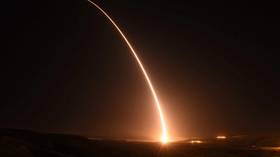North Korea reacts to failed US ICBM launch

North Korea has condemned a failed intercontinental ballistic missile (ICBM) test by the US military, warning of an “overwhelming” response to the Pentagon’s “provocative” and “reckless” actions on the Korean peninsula.
In comments carried by the state-run Korean Central News Agency (KCNA) on Friday, Pyongyang responded to Washington’s ill-fated missile launch earlier this week, which had to be shot down mid-flight due to an unspecified “anomaly,” according to the US Air Force.
“The recent and ongoing anti-DPRK military movements by the United States… are extremely provocative and reckless hostile acts that heighten military tension on the Korean peninsula,” the statement said, adding that North Korea is prepared for an “immediate, overwhelming, and decisive response.”
It went on to denounce the recent US deployment of nuclear-capable B-52 bombers to South Korea, saying Washington’s “nuclear weapons reinforcement maneuver” was a “dangerous attempt to achieve military hegemony.”
Wednesday’s Minuteman III ICBM test had been announced earlier in the week by Pentagon spokesman Brigadier General Pat Ryder, who said the launch would demonstrate the “redundancy and reliability of our strategic-deterrence system while sending a visible message of assurance to allies.”
Though the test ultimately fizzled, the military said it provided “vital data” and that the Air Force “learns lessons from every test launch.” Officials stressed that such trials ensure the “continued reliability and accuracy” of the aging Minuteman III, the first variant of which entered service in 1970.
Earlier this year, President Joe Biden said the Pentagon would enhance the “regular visibility” of strategic military assets on the Korean peninsula, hoping the move would improve “deterrence” against the DPRK. Soon after, the Pentagon dispatched a nuclear ballistic missile submarine to South Korea for the first time since 1981, also drawing harsh condemnation from the North.
Pyongyang codified a new nuclear weapons doctrine into law last September, declaring that its acquisition of the bomb was “irreversible,” while authorizing the first-use of nuclear weapons if an enemy attack is “judged to be imminent.”
In its statement on Friday, the DPRK said the “nuclear threat” posed by the US was “approaching a new danger line,” adding that developing its atomic arsenal was “an exercise of the right of self-defense.”
North Korea has gradually escalated its own missile tests since Biden took office in 2021, deeming them a legitimate response to stepped-up US-South Korean military drills in the region. Washington, Seoul and other allies have repeatedly slammed the launches as provocative and illegal under international law, and insist their war games are purely defensive in nature.














